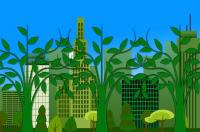Preparing for Life After Coronavirus.
 The Science Festival is already looking to life after the coronavirus. with an interactive talk happening this Tuesday:
The Science Festival is already looking to life after the coronavirus. with an interactive talk happening this Tuesday:
ONLINE: talk on clean growth in Sidmouth
This is part of its Clean Growth project:
The Clean Growth project from the Science Festival
.
And it is running in parallel with the VGS project:
“Sidmouth 2020” project launched
.
We have to be looking to what happens after the current crisis.
The dramatic situation will undoubtedly have dramatic effects on the environment – although it’s too early to say what exactly:
Mixed signals for sustainability
Carbon emissions are really tricky to measure precisely
.
The work of the Science Festival, the Town Council, the VGS and others will be key to how we go forward once the crisis is over. And we won’t be ‘going back to normal’ – so will have to think about where we do want to go.
One thing is clear: that we will probably have to accept that ‘growth’ will not be as fast as before:
And another is that many will not want to return to the commuter rat race:
A permanent shift towards home working…
.
The Science Festival’s virtual Café Scientifique talk on Tuesday will put much of this into context as we look forward to how we want things to be. Perhaps some new ideas for initiatives will come out of that session:
- A joint Science Fest/Vision Group for Sidmouth project is looking at improving the biodiversity/horticulture of the Sid Valley, which any ‘growth’ will have to take into account: Biodiversity in the Sid Valley
- We need to plan for an economy not solely based on the hospitality industry which has collapsed: Concern for the Sidmouth tourist industry
- The Lighthouse is one initiative which might show the way ahead: Lighthouse Sidmouth business hub to shine a light on entrepreneurial community
- We have to think beyond Sidmouth as a retirement town, following the even starker demographic divisions during the current crisis: the Neighbourhood Plan tried to address that, but it was too late to have any effect on the gated developments for over- 55s at Knowle and Sidford: Overdevelopment in Sidmouth
The Science Festival and other groups are in a strong position to show initiative; the science is needed to demonstrate how we can move forward; and the support of the local councils is needed to make it happen. We seem to have this – which all add to the solidity of the necessary foundations for further work.
.Finall
Finally, more context…
.
There is BC and there is AC, as suggested by Thomas Friedman in the New York Times:
Our New Historical Divide: B.C. and A.C. — the World Before Corona and the World After | nytimes.com
.
And Peter Hennessey on the BBC:
Coronavirus: The month everything changed | bbc.co.uk
Coronavirus: Will the crisis change everything or nothing? | bbc.co.uk
With more from Yuval Noah Harari in the FT:
.
Yuval Noah Harari: the world after coronavirus | Free to read
This storm will pass. But the choices we make now could change our lives for years to come
Under-the-skin surveillance
In order to stop the epidemic, entire populations need to comply with certain guidelines. There are two main ways of achieving this. One method is for the government to monitor people, and punish those who break the rules…
The emergency pudding
One of the problems we face in working out where we stand on surveillance is that none of us know exactly how we are being surveilled, and what the coming years might bring…
The soap police
Asking people to choose between privacy and health is, in fact, the very root of the problem. Because this is a false choice. We can and should enjoy both privacy and health. We can choose to protect our health and stop the coronavirus epidemic not by instituting totalitarian surveillance regimes, but rather by empowering citizens. In recent weeks, some of the most successful efforts to contain the coronavirus epidemic were orchestrated by South Korea, Taiwan and Singapore. While these countries have made some use of tracking applications, they have relied far more on extensive testing, on honest reporting, and on the willing co-operation of a well-informed public…
We need a global plan
The second important choice we confront is between nationalist isolation and global solidarity. Both the epidemic itself and the resulting economic crisis are global problems. They can be solved effectively only by global co-operation…
… Humanity needs to make a choice. Will we travel down the route of disunity, or will we adopt the path of global solidarity? If we choose disunity, this will not only prolong the crisis, but will probably result in even worse catastrophes in the future. If we choose global solidarity, it will be a victory not only against the coronavirus, but against all future epidemics and crises that might assail humankind in the 21st century.
Yuval Noah Harari: the world after coronavirus | Free to read | ft.com
Plus on subscription:
Coronavirus is speeding up the decoupling of global economies | ft.com